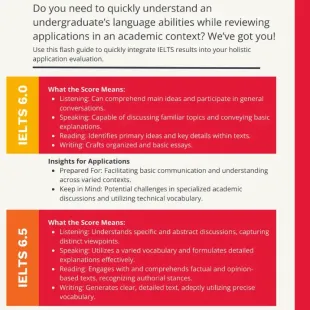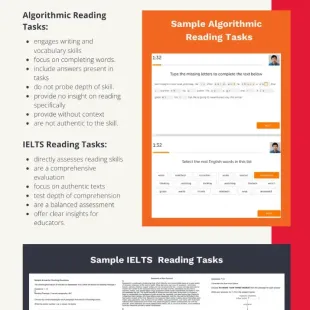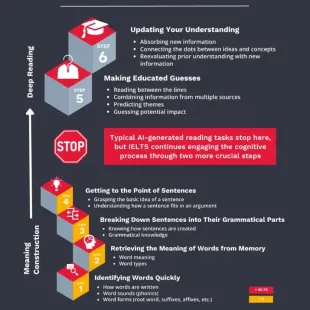The language test chosen can have major implications on student success
Are your future applicants ready to learn in English? For admissions professionals, this is critical. Ensuring every applicant is equipped to excel in studies goes beyond basic communication skills and requires a human touch. While algorithmic tools measure if an applicant can communicate in English, academic readiness - thinking critically, collaborating, and conveying content - calls for a deeper evaluation of language skills in the academic context.
By choosing assessments focused on English in academic instruction, admissions professionals gain a nuanced understanding of an applicant's potential. Evaluation in context provides a clear view of academic preparation and ensures each student admitted adds value to the institution and academic community.
In this white paper, we explore how IELTS captures the nature of language proficiency in academic settings and serves as a trustworthy partner for admissions professionals during applicant reviews.
Join the discussion on LinkedIn
Related Insights

Choosing the right English language test for university admissions
Nine key questions to ask about any English language test you are considering for university admissions.

IELTS – helping universities to recruit students with the right skills
Recruiting students with the right skills can be a big challenge for universities all over the world.

Comparing IELTS and DET
There are big differences between the two tests in terms of their suitability for recruiting students for higher education courses.

Everything you need to know about IELTS and the CEFR
The world’s most widely used tool for describing the levels of foreign language ability.
Most English tests only assess speech, not quality of communication.
Imagine speaking out loud in isolation to nothing but computers. Are you understood? Does your speech matter? Speaking alone does little to provide insight into how well someone can effectively engage in and maintain conversations which go beyond sounds and sentences.
IELTS assesses speaking ability through conversation.
The goal of learning English is to engage in meaningful conversations. At IELTS we understand this. We are assessing more than the ability to produce speech sounds and keywords, things that a computer can identify easily. Our examiners focus on real world readiness. Where technology falters, our expert examiners excel, capturing everything from the formation of an idea to how a speaker can refine, clarify, and focus in real time.
Our promise, an assessment that goes beyond rehearsed responses, providing real insight into a student's potential for world communication.
IELTS, we are the standard for a reason.
If you like this content...
Submit your information below and we'll share more insight to help you and your team make the best decisions for your applicants. Subscribe to receive our whitepapers and associated content as soon as they are released.



